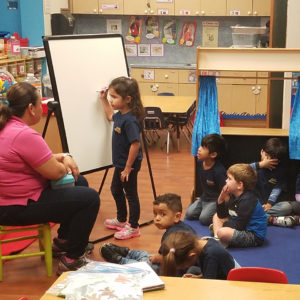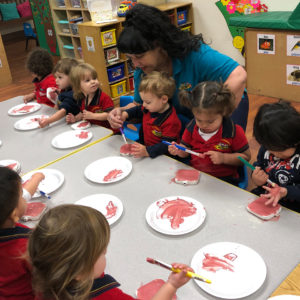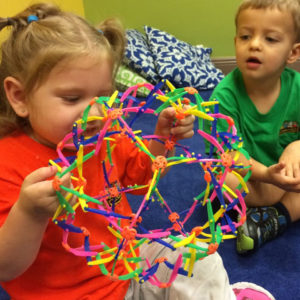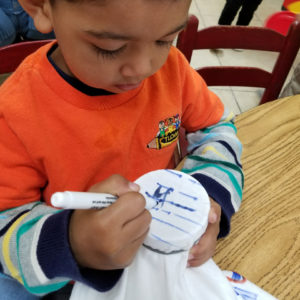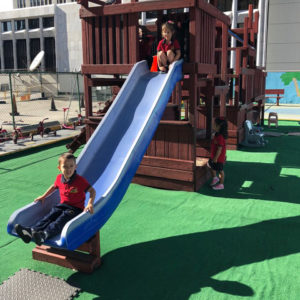TLC Downtown provides a structured, dynamic and social environment where the child is stimulated to explore, develop, adapt and grow.
There are many benefits for providing your child with early education and care at TLC Downtown. Below you find detailed information about our preschool classes.
CLASSES
PK-1
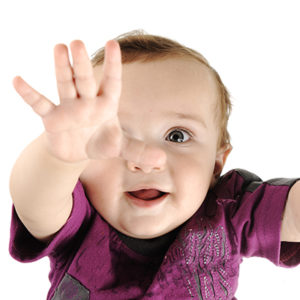
2 TO 12 MONTHS
Our room settings are designed to expose children to age appropriate experiences that will engage and inspire them. One year olds are encouraged to use their senses to learn about and make sense of their world.
Children have the opportunity for free play, circle time, group play, arts and crafts, and outdoor play/large muscle development.
Stimulation of visual, physical and language fields are crucial for the one year olds. It is also very important working on motor skills through finger play, make believe games and exploration of their immediate environment.
The development of fine motor skills will facilitate your child’s ability to write in the future. Auditory stimulation with the use of songs and circle time activities is also very important at this stage.
GROSS AND FINE MOTOR SKILLS: Whole body movement and coordination.
1. Exercises-movement songs: example- Ring a Round A Rosie.
2. To walk alone.
3. To climb up and down.
4. To bend over to pick up objects without falling over.
5. To pick up and carry large toys around the room.
6. Start to help with dressing: holding out arms for shirts, pulling off shoes and socks.
7. To practice stacking block, shapes, sorting, grasping several small objects and letting them go.
8. To do large puzzles, peg boards, nest toys.
9. To thread cubes.
10. To use play dough.
11. To use spoon when eating.
SENSORY-PERCEPTUAL: Visual and tactile experiences
1. To feel different textures- rough, hard, soft, smooth, and scratchy.
2. To see pictures.
3. Finger plays.
ART ACTIVITIES: exposing children to a variety of materials and mediums.
1. To have fun coloring with crayons, chalk, and markers.
2. To paint with brushes, finger-paints, pudding painting.
3. To paste and glue: collages, sand pictures, cereal and noddles.
LANGUAGE ARTS: Expressive and receptive language experiences.
1. Listen to songs and nursery rhymes.
2. To listen to teacher read stories.
3. To do circle time with different interactive activities.
4. To name and point out objects and parts of the body.
5. To listen to two-word sentences.
PK-2
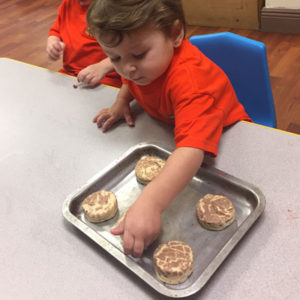
12 TO 24 MONTHS
Our PK2 class setting stimulates all five senses, encourages imagination and creativity.
Two year olds will acquire new vocabulary, mathematical relationships, problem solving, and learn through experience. Early literacy is emphasized through story time.
Our main goal is to provide 2 year old children with a comfortable, caring, and safe atmosphere.
At this stage, the development of language skills is very important. Two year old children are still using their hands while learning to properly communicate with words. Our teachers use positive guidance for an effective learning that matches each child’s individual needs.
LANGUAGE ARTS: Expressive and receptive language experiences
1. To develop language skills.
2. To use circle time each morning to verbally communicate with the children and teach them new words through repetition, songs, rhymes and stories.
3. To introduce them to different concepts like colors, shapes and different objects.
4. To incorporate songs and easy rhymes to help develop their memory.
Spcial Skills:
1. To promote safe behavior.
2. To work on their independence and basic social skills.
3. To develop the child’s self-esteem, confidence and love of learning.
4. To explore and learn in a very enthusiastic and fun way to make it enjoyable for the children.
5. To emphasis on discipline, mainly achieved by following a routine.
6. To help each child become potty-trained by being consistent. This will be achieved with the help of our trained staff in the school and of the parents at home.
7. To encourage the development of a positive self-concept.
SENSORY-PERCEPTUAL: Visual and tactile experiences
1. To offer an environment that awakens the children’s curiosity and interest in the world that surrounds them. Two year olds love to explore, this is why their classroom, Alphabet Castle, is filled with toys in the dramatic play area, blocks, library and arts center.
2. To promote creativity and imagination.
3. To introduce basic colors and shapes.
GROSS AND FINE MOTOR SKILLS: Whole body movement and coordination
1. To continue their physical development with plenty of activities mainly for their gross motor skills.
2. To work their fine motor skills to the maximum with specific activities of High Reach curriculum.
PK-3
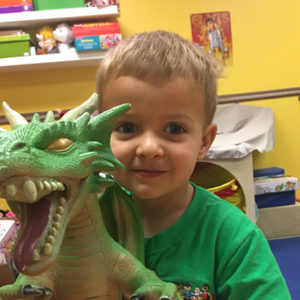
3 YEAR OLDS
The three-year-old class provides a stimulating environment for children to learn everyday how to be more independent, improve fine and gross motor skills and expand their imagination.
Activity centers provide the opportunity for learning through play pretend while directed activities provide a head-start on academics.
Pre-K III is a very important stage in a child’s life. At 3, children are introduced to many different concepts, ideas and activities. They are given rules to follow, they learn about the different consequences for their actions, and they are given goals to meet.
At this stage they realize they are no longer the center of attention. They learn that there are other children around them to play with. They will start making friends. At circle time and throughout the daily curriculum they will learn the colors, shapes, numbers, and a variety of rhymes and songs.
They will learn how to use the computer and during play at the Science and Library centers they will discover new worlds in the fields of biology, chemistry, physics, literature and geography, among others.
It is here where they will begin the first stage of writing. In Pre-K III a child will begin to develop and show his/her individual personality. Our teachers will pay utmost attention to help your child blossom into a confident, sociable and happy child. We strongly encourage parents as well to assist us in this endeavor by also reinforcing the child’s behavior with compliments, positive criticism, very open communication and a friendly, healthy environment at home.
SOCIAL SKILLS:
1. To build character values by respecting others and being role models.
2. To help the children develop cultural awareness.
LANGUAGE ARTS: Expressive and receptive language experiences
1. To use past, present and future in vocabulary
2. To follow simple instructions.
3. To ask and answer simple questions.
4. To describe purpose of objects.
5. To describe and relate events.
6. To gain knowledge of self.
SENSORY-PERCEPTUAL: Visual and tactile experiences
1. To match, sort, and identify several colors and shapes.
AUDITORY PERCEPTION: Listening experiences.
1. To identify environmental sounds and match these sounds with pictures (appropriate).
VISUAL DISCRIMINATION:
1. To describe and discriminate properties of objects (color, size, shape, and length).
2. To identify and describe similarities and differences.
GROSS AND FINE MOTOR SKILLS: Whole body and hand movement experiences
1. To move body parts as directed.
2. To move expressively to music
3. To follow walking pattern.
4. To cut patterns with scissors.
5. Assemble puzzles
6. Maintain balance when hopping in one foot.
7. Catching a playground ball.
8. Building with blocks and legos.
MATH SKILLS:
1. To practice number recognition and counting skills.
PK-4
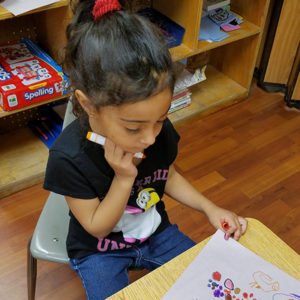
4 YEAR OLDS
Our PK4 class provides a head-start on academics helping children gain kindergarten readiness skills. TLC promotes the intellectual, social, emotional & physical development of each child.
Our Creative Curriculum includes literacy and math skills, hands-on science activities, art projects, and self-expression through a variety of activities.
Pre-K 4 is the beginning stage for kindergarten. In our Pre-K 4 classroom we give children the opportunity to make choices. This is very important in the development of their own individual personality.
Also at this stage they are ready to learn the sound of each letter, distinguish capital letters and lower case letters. They are capable of starting the pre-reading process and recognize numbers and quantities.
We provide a friendly and caring atmosphere in which each individual child’s needs are fulfilled.
PRE-READING AND WRITING SKILLS:
1. Match spoken words that begin with the same sound.
2. Name letters (spell letters)
3. Recognize sound of each letter).
4. Learn to brake down the sounds and learn how to put sounds together.
5. Sort letters from other symbols.
6. Clap or tap for each syllable of a word.
LANGUAGE ARTS: Expressive and receptive language experiences
1. To describe purpose of objects.
2. To describe and relate events.
3. To respond to questions of relations and objects.
4. To acquire vocabulary for expression and observation.
5. To develop a vocabulary for problem solving.
MATHEMATIC SKILLS:
1. Count by note.
2. Name numerals in print.
3. Match and name geometric shapes.
4. Use one to one correspondence in counting.
GROSS AND FINE MOTOR SKILLS: Whole body and hand movement experiences
1. To perform balance tasks.
2. To perform hopping and jumping tasks.
3. To move expressively to music
4. To follow walking pattern.
5. To reproduce a rhythm pattern.
6. To remember and perform two or three actions in order.
7. To cut more complex patterns with scissors and use scissors with control.
8. To perform simple paper folding tasks.
9. Hold a writing instrument between thumb and finger.
10. wash hands properly
11. Brush teeth properly
VISUAL DISCRIMINATION:
1. To identify missing parts of objects, shapes, letters, and numerals.
2. To match, sort, and name letters and numerals.
3. To reproduce a series of letters or numerals from memory.
4. To reproduce and name a sequence of four items form memory.
5. To sequence objects, pictures and symbols from left to right.
AUDITORY PERCEPTION: Listening experiences
1. To respond to presence and/or absence of location of sound.
2. To use creative expression in recalling poems and role-playing in stories.
3. To remember and tell highlights of a story in sequence.
4. To identify specific works from sentence context.
5. To discriminate texture, shapes, and sizes through touch.
SENSORY-PERCEPTUAL: Visual and tactile experiences
1. To create a sequence of objects according to size.
2. To classify objects by one attribute.
3. To classify pictures by categories.
4. To reproduce 3-dimensional patterns.
5. To identify missing parts of pictures and puzzles.
6. To reproduce and name a sequence of at least 3 objects from memory.
SOCIAL SKILLS:
1. Share family experiences and/or traditions
2. Express pride in accomplishments.
3. Show awareness of jobs and their requirements.
4. Set personal goals and follow through.
5. Talk with others to solve problems.
6. Increase self esteem and be confident about their choices.
7. To show respect for others
8. To show a socially acceptable behavior.
9. To stimulate tolerance and control.
10. To understand responsibility for his/her actions and decisions.

